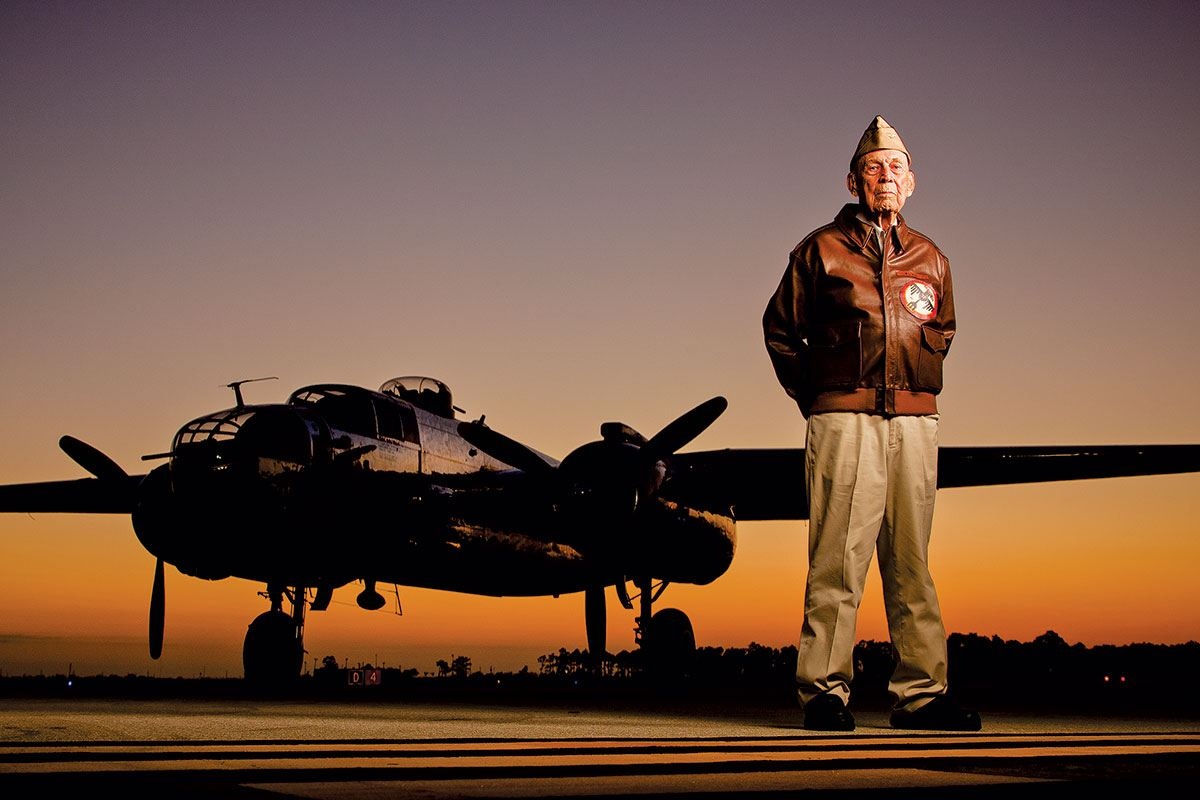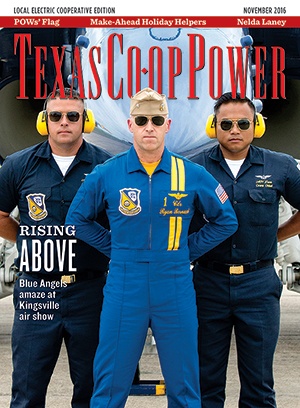It was a hot Florida day in 2010 when Col. R.E. Cole, former co-pilot to Jimmy Doolittle, strapped himself into the right-hand seat of pilot Larry Kelley’s restored World War II-era B-25 bomber, Panchito. Seventy years had passed since Cole followed that routine aboard the USS Hornet and flew a daring mission over imperial Japan.
In April 1942, Cole, then a lieutenant, flew with Doolittle, who led 80 volunteers on the legendary Doolittle Tokyo Raid. That attack provided a boost to the hearts and morale of their fellow Americans, who were still reeling from Japan’s disastrous attack on Pearl Harbor four months earlier.
Cole, 101, is the last living member of the Doolittle Tokyo Raiders. He lives in Comfort and is a member of Bandera Electric Cooperative.
On this day, we wouldn’t be taking off from the short deck of an aircraft carrier, as they did in 1942. The only missions on this adventure were a short flight to a weekend air show and for photographer Robert Seale to capture images of Cole flying a B-25 again. Cole’s 90-plus-year-old hands gripped the flight controls and performed the preflight checks from memory.
Within minutes, the giant engines popped and thumped to life, and the aromas of burned oil, hydraulic fluid and all the usual perfumes of a vintage bomber assailed our senses. Time was suspended, and for a moment, it was 1942 again. Cole and Kelley advanced the throttles, and the 3,400-horsepower engines pulled us down the runway until the air over the wings lifted our time machine toward the clouds. In his professionalism, Cole displayed no giant grin or boyish transformation, rather the quiet confidence of a man completely in control of his flying machine.
Like so many of the World War II generation, Cole’s service was all-in; they served until victory was complete. After the Doolittle Raid, Cole volunteered for ferry command, which meant flying critical cargo across the most treacherous, unforgiving mountains in the world, the Himalayas. This route was called “flying the hump.” He navigated with inadequate maps through horrible weather in ill-equipped aircraft, but managed to survive. Cole found his way back to the U.S. in 1943, but quickly volunteered to become an Air Commando and took part in an invasion of Burma.
After our short flight, we arrived at the show where Kelley was scheduled to fly the B-25. Kelley had arranged with the air boss for us to perform a low-level pass as part of the rehearsal for the air show. Cole’s eyes fixed on the end of the runway and his arms, hands and legs, in one coordinated effort, deftly rotated the control wheel and rudder pedals to send Panchito zooming toward Earth. Flying a B-25 is much like driving a massive truck without power steering, but Cole made it look easy.
Our speed increased, and our trajectory was established; a perfect low pass was imminent. As the sound of the roaring B-25 announced our approach, fellow aviators on the ground jumped and waved. Cole eased the entire control column back and flattened our dive. He and Kelley called out altitudes and airspeeds, and before long we were hurtling above the runway like a highly polished freight train.
When Cole pitched Panchito back toward the clouds, it struck me that on April 18, 1942, he had performed the same maneuver over the coast of Japan. The Doolittle Raiders flew in low and popped up at the last second before releasing the bombs.
Cole went on to serve out a career in the military, raise a family and establish a successful home-building business in Texas. Most of the children of the Doolittle Raiders will tell you they had little idea what their fathers did in the war until much later in life. The story I usually hear from their children is that they want people to know what amazing fathers, husbands and mentors their dads were.
The Doolittle Raiders have come to represent so much more than their famous mission. They represent the greatest qualities that most Americans strive to attain, such as duty to country and service before self.
In interviews and meetings with the surviving Doolittle Raiders over the years, they always said the same thing: “We were just doing our job.”
——————-
Matt Jolley is the founder of the Edward R. Murrow Award-winning station warbirdradio.com.


